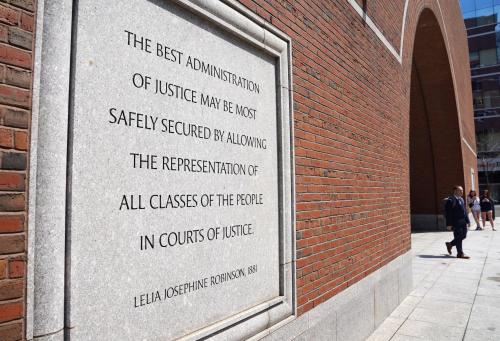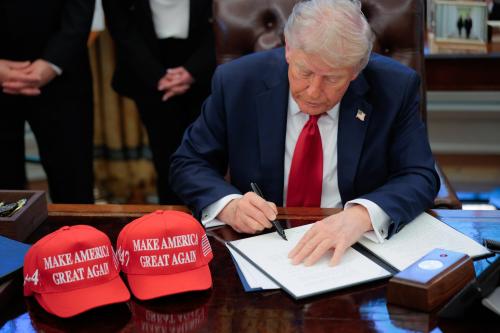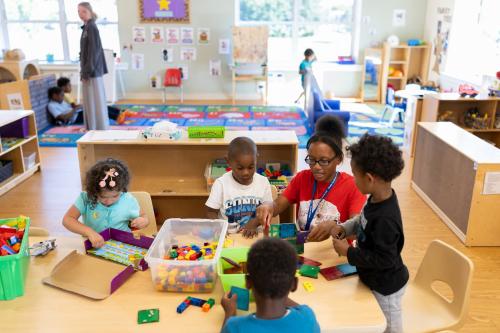Who was the greatest American president? According to the latest Gallup poll, 18% of Americans picked Abraham Lincoln. Second place goes to Ronald Reagan, 16%, followed by John F. Kennedy, 14%, Bill Clinton, 13%, and Franklin D. Roosevelt, 9%.
These numbers demonstrate that the public is woefully ignorant of history. That only 18% name Lincoln as the most significant president is strange enough. But to suggest that Reagan, Kennedy, and Clinton follow close behind Lincoln and were “greater” presidents than George Washington, Thomas Jefferson, and Theodore Roosevelt is bizarre. Certainly they were charismatic, but that wasn’t the question. The question was about greatness, and greatness is defined by specific accomplishments.
When the Gallup organization looked at responses by party affiliation, the results were, if anything, even more depressing.
Twenty-five percent of Democrats voted for Clinton and 20% voted for Kennedy as the greatest presidents in history, with Lincoln and FDR tied for third place.
Among Republicans, Reagan was the greatest in history at 32%, followed by Lincoln, Kennedy, Washington, and George W. Bush.
Leave aside the fact that the faces of Washington, Jefferson, Lincoln, and Roosevelt are carved on Mount Rushmore as national icons. For nearly 60 years, surveys of academic historians and political scientists have ranked the nation’s presidents by their accomplishments.
The three presidents who regularly are at the top of these lists are George Washington, Abraham Lincoln, and Franklin D. Roosevelt. Close behind them are Thomas Jefferson and Theodore Roosevelt. Other presidents who are often placed by scholars in the top 10 are Woodrow Wilson, Dwight Eisenhower, Andrew Jackson, James Monroe, James Madison, Harry Truman, and James Polk.
Washington is highly regarded for his unifying role as the first president and for his voluntary relinquishing of power after two terms, which set a precedent for the peaceful transition of power to a successor. Lincoln is admired for his leadership during the Civil War, his Emancipation Proclamation, and his brilliant speeches, e.g., the Gettysburg Address. Franklin D. Roosevelt wins acclaim for his leadership during the Great Depression and World War II.
Scholarly reappraisals and the passage of time tend to raise or lower the esteem in which presidents are held. For example, when Truman left office, he was not considered one of the greats. But in the past generation, scholars and people of different political persuasions have come to appreciate the historic significance of his foreign and domestic leadership. Similarly, Reagan’s stock has been rising; a recent biography by John Patrick Diggins, ” Ronald Reagan: Fate, Freedom, and the Making of History” places Reagan among the greatest presidents because of his leadership in ending the Cold War and his commitment to freedom.
To compare the achievements of presidents over the relatively short history of America, you have to know something about them. You have to know who they were, for starters, and what they did, and why it matters.
Based on the Gallup poll, most Americans don’t know enough about their own nation’s history to have such a discussion. The latest national test of U.S. history, released last week by the Federal Department of Education, shows that our high school students are not learning enough history to discuss the pluses and minuses of our presidents. A majority of high school seniors scored “below basic” on a national test of American history. In no other subject tested—reading, mathematics, or science—do high school students score so poorly.
Why does history matter? It is the foundation of political intelligence. We can’t have thoughtful public discussions of issues when the public is so woefully uninformed about the past. We have allowed our culture to be seduced, ensnared, and dumbed down by a vacuous popular culture. If we gave tests that asked about rock stars and movies, our students and the general public would get high grades. We can be certain that the public knows more about Paris Hilton than George Washington.
Without a public that knows its history, without political intelligence widely dispersed, we can anticipate a future in which our politics is continually degraded to the lowest common denominator.
To reverse this downward spiral in public knowledge, we need a national commitment to strengthen history education in schools, colleges, and universities. Every student should study American and world history, not just in high school, but in the elementary and middle school grades. Everyone who teaches history should have a degree or pass a test of the knowledge that they will teach.
The situation is bleak, but not beyond repair. We must start now to build the public intelligence on which our democracy depends.
The Brookings Institution is committed to quality, independence, and impact.
We are supported by a diverse array of funders. In line with our values and policies, each Brookings publication represents the sole views of its author(s).



Commentary
Op-edFirst, Get the Knowledge
May 25, 2007